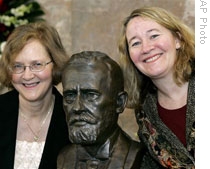Get Flash Player
Download
This is the VOA Special English Health Report.
Three scientists based in the United States have won the two thousand nine Nobel Prize for Physiology or Medicine. They are being honored for their work in the nineteen eighties about the health of cells and the aging process.
|

Elizabeth Blackburn, left, and Carol Greider after receiving a science prize in Frankfurt, Germany, earlier this year
|
The winners are Elizabeth Blackburn from the University of California, San Francisco; Jack Szostak from Harvard Medical School in Massachusetts and Carol Greider from Johns Hopkins University in Maryland. They will share the one million four hundred thousand dollar prize.
The scientists' work begins with telomeres. These are like protective coverings on the ends of chromosomes. Elizabeth Blackburn compares them to the plastic tips on the ends of shoelaces. She says without telomeres the chromosome and the genes it holds would come apart.
Telomeres are necessary for a cell to divide. They also are involved in directing the number of divisions.
Ms. Blackburn and Mister Szostak discovered the special system of genetic information in the telomeres that protects the chromosomes from ruin. Later, Ms. Blackburn and Ms. Greider discovered the substance in the body that builds telomeres. The scientists named the enzyme telomerase.
Their research showed that cells age if telomeres are shortened. But, cell death is delayed if a lot of the enzyme telomerase is produced.
Rune Toftgard is a Nobel Committee member from Sweden's Karolinska Institute. He says the work of telomeres is important to the understanding of how genetic material is copied and saved.
RUNE TOFTGARD: "All genes are encoded by DNA and the DNA is present in the chromosomes in the cell nucleus and telomeres, they are the ends of the chromosomes and they have an important function to protect the chromosomes and maintain the integrity of the chromosomes."
The telomere research expanded scientific knowledge about diseases and led to possible new treatments. For example, some research suggests that cancer cells use telomerase to grow uncontrollably. Some scientists are studying whether drugs that block the enzyme can help fight cancer.
And that's the VOA Special English Health Report, written by Caty Weaver. For more health news, go to voanews.com. You can also follow us on Twitter and YouTube at VOA Learning English. I'm Mario Ritter.
Related stories:
華人科學(xué)家高錕獲諾貝爾物理學(xué)獎
(Souce: VOA 英語點(diǎn)津姍姍編輯)